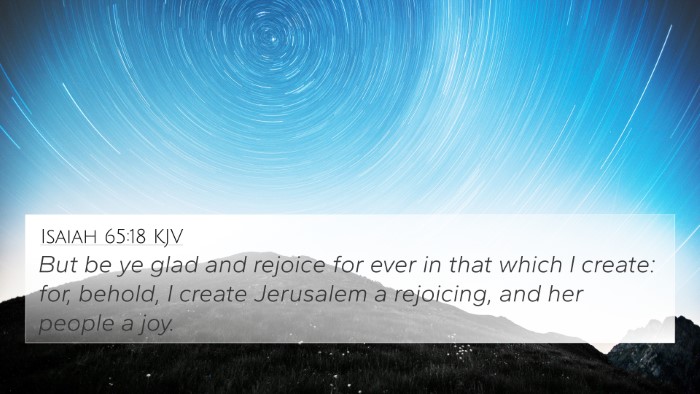Psalms 86:4 - Summary of Meaning
Psalms 86:4 states: "Bring me, Your servant, into Your presence, for I will be glad in Your mercy; for to You, O Lord, do I lift up my soul." This verse encapsulates David's heartfelt plea for divine assistance, revealing key insights into the themes of mercy, dependence, and the desire for intimacy with God.
Contextual Analysis
Within this psalm, David finds himself in a place of distress and seeks refuge in God. According to Matthew Henry, the psalm is characterized by a plea for help, where the psalmist demonstrates a deep dependence on God's goodness and mercy. His expression of need highlights the relationship between human frailty and divine strength.
Albert Barnes points out that David's request is not a mere formality but a sincere desire to experience God's presence and favor. The phrase "bring me" signifies an active plea for God to intervene in his life, suggesting a longing for a closer relationship.
Adam Clarke elaborates on the implications of "lifting up my soul," stating that it refers to a complete surrender of oneself to God. This act signifies a moment of worship and trust, where David completely entrusts his spirit into the hands of the Lord.
Thematic Connections
The verse presents several themes including:
- Divine Mercy: The focus on mercy highlights God's compassionate nature.
- Human Dependence: David acknowledges his need for God, illustrating the necessity of reliance on divine assistance.
- Intimacy with God: The request for presence signifies a deep yearning for communion with the divine.
- Spiritual Surrender: Lifting up his soul presents a picture of trust and surrender, essential in David's relationship with God.
Bible Verse Cross-References
Psalms 86:4 can be cross-referenced with several other scriptures that enrich our understanding of its themes:
- Psalms 25:1: “Unto you, O Lord, do I lift up my soul.” - Similar plea for divine guidance.
- Psalms 130:5: “I wait for the Lord, my soul waits.” - Emphasizes waiting on God's mercy.
- Psalms 119:76: “Let Your merciful kindness be for my comfort.” - Connection to mercy as a source of comfort.
- Luke 1:54-55: “He has helped His servant Israel.” - Reflects God’s faithfulness to His servants.
- Matthew 11:28: “Come to me, all you who labor and are heavy laden.” - Echoes the invitation for divine assistance.
- John 14:2-3: “In my Father’s house are many mansions.” - Highlights the theme of God’s presence and comfort.
- James 4:8: “Draw near to God, and He will draw near to you.” - Encouragement for an intimate relationship with God.
Comparative Bible Verse Analysis
A comparative analysis of these verses provides insights into the consistent portrayal of God as a source of refuge, mercy, and nurturing presence. The connections between these scriptures reveal a broad biblical narrative tying together themes of divine mercy, salvation, and communion with God.
Using Bible Cross-References
To effectively understand and analyze biblical texts such as Psalms 86:4, utilizing tools for cross-referencing can significantly enhance one’s study. A bible cross-reference guide may assist in discovering how various verses relate to one another, providing context and reinforcing key themes. Familiarizing oneself with a bible concordance or bible reference resource is also essential in tracing influential themes across the scriptures.
How to Use Bible Cross-References
When approaching cross-referencing biblical texts, consider the following steps:
- Identify themes or keywords present within the verses.
- Utilize a Bible concordance to find related scriptures.
- Engage in a comparative study, noting similarities and differences in context and meaning.
- Discuss interpretations with others or consult public domain commentaries for varied insights.
Exploring Inter-Biblical Dialogue
Understanding Psalms 86:4 is enriched by exploring inter-biblical dialogue, especially when connecting Old Testament themes with teachings of the New Testament. For example, comparing David's reliance on God's mercy with the teachings of Jesus on grace and forgiveness further reveals the continuity of God's character throughout scripture.
Conclusion
Psalms 86:4 serves as a poignant reminder of our need for divine assistance and the depth of mercy found in God. A thorough study of related verses and themes demonstrates the richness of the biblical text and calls for a deeper engagement with the Word of God. Through careful reflection and study, believers can cultivate a closer relationship with the divine, characterized by trust, surrender, and intimacy.









